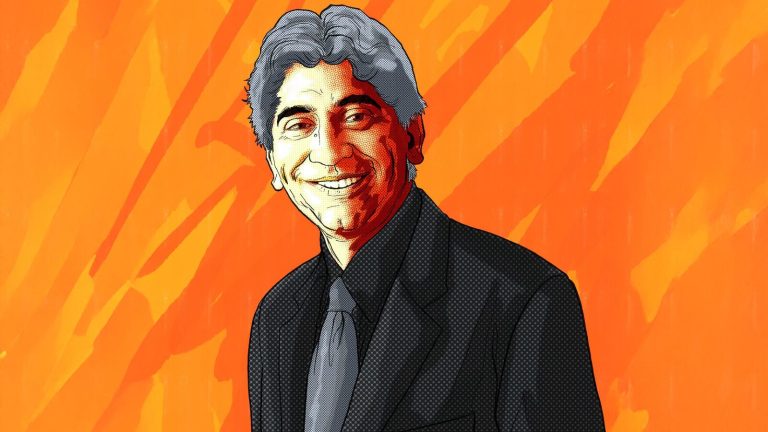Ashok Amritraj, from the famed tennis family that accounted for the A in the ABC (Amritraj, Borg, Connors) of the 1970s tennis world, is today a synonym for success as a powerful Hollywood mogul. The youngest of three brothers that included Vijay and doubles specialist Anand, Ashok’s transition from the tennis court to Tinseltown is itself a testament to an unstoppable drive in a very white world. It is a journey of calculated risk-taking and strategic and cultural bridge-building between the East and the West.
According to the 69-year-old, tennis taught him not just discipline and strategy but also how to compete on the international stage, where he was always seen as an outsider. As a prelude to his incipient future, Ashok showcased a remarkable talent for tennis, competing in all four major grand slam tournaments and reaching the finals of the Wimbledon juniors in 1974. His on-court prowess led him to the World Team Tennis circuit in the US, where he played with legends like Billie Jean King and Chris Evert.
Long road to Hollywood
But a time came when the self-confessed film buff realized his tennis career was winding down. That’s when he pivoted to Hollywood, using the plethora of contacts tennis had thrown his way. He was invited to the homes of stars, but all of them wanted to play with him to improve their backhands and serves. Amritraj pitched his scripts and stories to them to little avail.
Persistence, stemming from years of attritional battles on the tennis courts, was his ally. Initially, he faced rejection and ridicule, but he kept making small-budget films. In 1984, he and Vijay raised some money from Indian friends and produced Fear in a Handful of Dust. It wasn’t a hit but it did teach him the mechanics of producing a movie.
It was Double Impact with the redoubtable Jean-Claude van Damme in 1991 that represented his first big success. Amritraj says that just like in tennis, he attempted the spectacular shots later, concentrating on his shaky first steps in humdrum filmmaking. Tongue firmly in cheek, he told HuffPost in a 2017 interview: “It took me 10 years to become an overnight success.”
Eventually, he became the definition of a trailblazer by producing 100 films garnering revenues of over $2 billion and notching up a personal net worth estimated at over $300 million derived from his production company, strategic investments and extensive real estate.
His collaborations spanned every major studio in Hollywood, bringing to life films featuring A-listers like Robert de Niro, Dustin Hoffman, Sandra Bullock, Bruce Willis, Angelina Jolie and Cate Blanchett. He produced the 1999 action thriller Boondock Saints, the 2001 heist caper Bandits and the 2004 action thriller Walking Tall. With Steve Martin and Queen Latifah, he made Bring Down the House, a pure commercial play.
Hollywood insiders say Amritraj always sees a story as a business proposition matching a specific audience segment.
The Hollywood mogul
In 1999, Amritraj founded Hyde Park Entertainment, named after the London park where he watched tennis as a boy, envisioning it as the modern alternative to the traditional Hollywood studio system. The company’s mandate encompassed feature films, television, digital content, and local language productions.
Under this banner, he produced notable films such as Ghost Rider starring Nicholas Cage and the critically acclaimed 99 Homes, which couldn’t make it to screen till Amritraj stepped in to fully finance it and take it to film festivals where it won a number of awards.
Today, his network spans Hollywood’s premier executives, international financiers and A-grade talents. His reputation for integrity and delivering on promises has made him a trusted partner for studios like Disney, MGM, and Sony.
Amritraj’s business strategy has been characterized by strategic partnerships and a keen eye for global trends. In 2008, Hyde Park Entertainment formed a joint venture with Imagenation Abu Dhabi (now Image Nation Abu Dhabi) to produce films that catered to a global audience.
Further expanding this global footprint, amalgamating diverse demographics, he launched Hyde Park Entertainment Asia to bring Asian narratives to the forefront. In India, he collaborated with Anurag Kashyap and Zoya Akhtar, two experimental filmmakers, as well as with established commercial directors like Shankar, with whom he made Jeans in 1998 with Aishwarya Rai in the lead.
His recent ventures highlight a strategic blend of his sports background and entertainment expertise. In collaboration with Terra Invest, Hyde Park Investment acquired the Delhi franchise of the World Pickleball League named Delhi Dillwale.
Amritraj’s journey is more than a personal success story; it’s a pioneering narrative of cultural bridging during an era when representation in global entertainment was dramatically limited. In the 1970s and 1980s, when Hollywood was overwhelmingly white and monocultural, Amritraj was carving a path for South Asian entrepreneurs in an industry notorious for its exclusivity.



